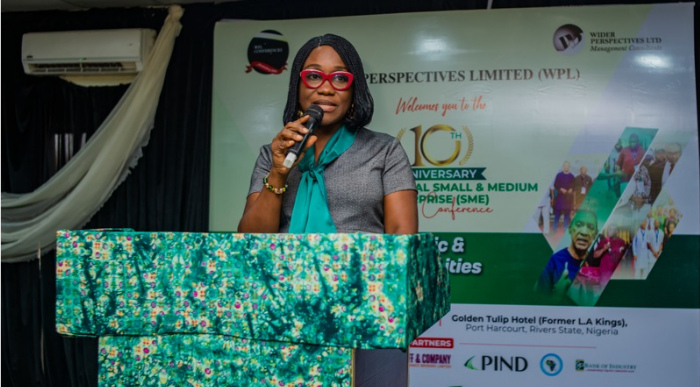Africa must embrace a new financing model tailored to its unique economic landscape if it hopes to empower small and medium enterprises (SMEs) and drive true continental growth. This was the resounding message from stakeholders, policy advocates, and financial experts at the 10th SME Conference organised by Wider Perspectives Limited (WPL), held in Port Harcourt, Rivers State.
Delivering the keynote address, Ebiekure Jasper Eradiri, President of the All Africa SMEs and a pioneer figure in continental SME advocacy, emphasized that SMEs represent 80% of Africa’s economy, yet continue to be stifled by outdated, colonial-era lending models. He stressed the need for a redefined Afrocentric financing template that recognizes the informal sector, simplifies loan processes, and moves away from rigid banking criteria that ignore local realities.
“We must challenge what banks say to deny loans. Why can’t we accept a degree certificate as collateral to start a business?” Eradiri asked, calling for systemic reform.
He further noted that Nigeria alone accounts for 40 million of Africa’s 100 million SMEs, highlighting the country’s potential as a continental leader in SME-driven growth. The African Continental Free Trade Agreement (AfCFTA), he said, offers an opportunity for deeper intra-African collaboration, but only if nations unlock the entrepreneurial potential of their SME sectors.
From Vision to Action: BOI and Regional Progress
Pacqueens Irabor, South-South business development lead at the Bank of Industry (BOI), revealed remarkable improvements in SME lending across the region. Since 2020, South-South Nigeria’s access to BOI loans has grown from under ₦4.4 billion to over ₦20 billion, with Rivers State alone receiving ₦7 billion in 2025.
Highlighting innovative programs like the RAPID scheme, Irabor noted that rural businesses now benefit from a 40% grant refund upon full loan repayment. He urged entrepreneurs to seize the opportunity, saying, “The money is waiting. As long as you have a registered business, you are eligible.”
Rivers State and the Need for Leadership
Despite signs of progress in states like Abia, Akwa Ibom, and Bayelsa, the question of Rivers State’s readiness loomed large. Chamberlain Peterside, former Rivers Finance Commissioner and RIPA Director-General (currently suspended), said the state’s potential remains untapped. He noted that SMEs are the ones that truly need support, not the large corporations.
Jonathan Tobin, Managing Director of the Rivers Microfinance Agency (RIMA), added that even amidst a state of emergency, RIMA had disbursed ₦4 billion in loans, reaffirming the resilience of the private sector. “We are giving and recovering loans despite it,” he stated.
Wider Perspectives’ 10-Year Impact
Edughom Hanson, WPL Managing Director, traced the conference’s origins to lessons from the ILO and World Bank SME programs. Over a decade, the conference has evolved into a regional powerhouse, uniting the BAAR states (Bayelsa, Abia, Akwa Ibom, and Rivers) and building a network of thriving SMEs.
Impact in numbers:
-
₦224 million accessed by 187 SMEs
-
493 new jobs created
-
4,983 SMEs trained
-
293 SMEs linked to new markets
-
50+ conferences held with 20,000+ attendees
The initiative’s focus on capacity building, financing, and market access has helped SMEs create wealth, spark innovation, and form strategic partnerships across the region.
Leadership and Advocacy: The Apiafi Legacy
Kalada Apiafi, Chairman of WPL and architect of the conference series, reiterated the importance of pushing SME-friendly policies. He recalled the fight for the “One LGA, One SME” policy, and how Abia State emerged as an early leader in regional SME development. Apiafi urged governments to include SMEs in their annual budgets, citing Japan as a model where small businesses receive feasibility studies and loan guarantees at no cost.
“No economy grows without an enabling environment,” Apiafi stressed. “Let states compete and LGAs learn from each other.”
PHCCIMA’s Push and Final Reflections
Representing Port Harcourt Chamber of Commerce (PHCCIMA), Emeka Ezekwe decried the survival-by-luck syndrome in Nigerian business, advocating for stronger support systems, security, and public-private partnerships.
PHCCIMA pledged to continue SME evangelism, offering door-to-door awareness and trade linkages. “SMEs make up 84% of all jobs in Nigeria. Let’s help them thrive,” he urged.
Conclusion: Is Rivers Ready?
With Abia leading, Akwa Ibom surging, and Bayelsa eager, the SME ecosystem in the BAAR states is clearly awakening. But as the 10th SME Conference sounded the bell for regional convergence, stakeholders asked: Will Rivers State, despite its current political and security hurdles, rise to meet the moment and complete the circle? The momentum for regional economic transformation has begun—the only question is who will lead, and who will be left behind.

